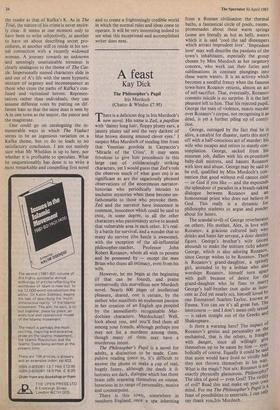A feast
Kay Dick
The Philosopher's Pupil Iris Murdoch (Chatto & Windus £7.95)
There is a delicious dog in Iris Murdoch's new novel. His name is Zed, a papilla)? with `dainty long hair, floppy plumy ears, a jaunty plumy tail and the very darkest of blue brown shining amused clever eyes.' I suspect Miss Murdoch of stealing him from that Venetian gondola in Carpaccio's `Miracle of the Cross'. It may seem frivolous to give him precedence in this large cast of exhilaratingly striking characters, yet I would guess that Zed's role. (he observes much of what goes on) is as significant as are the sagaciously phrased observations of fhe anonymous narrator- historian who periodically intrudes to unclutter mysteries when these become un- fathomable to those who provoke them. Zed and the narrator have innocence in common, innocence which could be said to exist, in some degree, in all the other characters who passionately strive to assault that vulnerable area in each other. It's real- ly a battle for survival, and a wonder that so many do survive (the battle is awesome), with the exception of the all-influential philosopher-teacher, Professor John Robert Rozanov, whom all wish to possess and be possessed by — except the man Brian who shuns all intimacy, even from his wife.
However, let me begin at the beginning (if that can be found), and praise unreservedly this marvellous new Murdoch novel. Nearly 600 pages of intellectual pleasure, shared, one is certain, by the author who manifests an exuberant passion in her creation of an English spa peopled by the immediately recognisable Mur- dochian characters. Murdochian? Well, look about you, and you'll find them all among your friends, although perhaps you may not list a murderer among them, though many of them may have a murderous intent.
The Philosopher's Pupil is a novel for adults, a distinction to be made. Com- pulsive reading (once in, it's difficult to answer the phone or make a cup of tea), hugely funny, although the deeds it il- lustrates are dark, dialogue which has those brain cells renewing themselves en vitesse, luxurious in its range of personality, motive and counterpoint.
There is this town, somewhere in southern England, once a spa inheriting from a Roman civilisation the thermal baths, a fantastical circle of pools, rooms, promenades about these warm springs (some are literally as hot as hell), waters which it is said 'cool the sad distempers which attract imprudent love'. `Imprudent love' may well describe the passions of the town's inhabitants, especially the group chosen by Miss Murdoch as her targetory concern, who work out their furies and sublimations in constant plungings into these warm waters. It is an activity which becomes a needful frenzy when the famous town-born Rozanov returns, almost an act of self-sacrifice. That, eventually, Rozanov commits suicide is no surprise. It is the last pleasure left to him. That his rejected pupil, George the man of violence, enacts murder over Rozanov's corpse, not recognising it as dead, is yet a further piling up of contri- tion.
George, outraged by the fact that he is alive, a catalyst for disaster, starts this story off with a half-conscious act of murder: his wife who escapes and retires to stately con- templation. George, sacked from his museum job, dallies with his ex-prostitute baby-doll mistress, and haunts Rozanov with love and abuse. George may be said to be evil, qualified by Miss Murdoch's con- tention that good without evil cannot exist or God if you like — and she expounds the splendour of paradox in a breath-taking dialogue between Rozanov and an homosexual priest who does not believe in God. This really is a dynamic for philosophy students to argue and ponder about for hours.
The scandal (evil) of George reverberates on others. His mother, Alex, in love with Rozanov, a gracious cultured lady who drinks and hates her servant, a dour destiny figure. George's brother's wife (incest abounds to make the mixture rich) adores George, which is also adoring Rozanov, since George wishes to be Rozanov. There is Rozanov's grand-daughter, a spritelY girl, attended to by a lesbian who also worships Rozanov, himself torn apart with guilt because of desire for the grand-daughter who he fixes to marry George's half-brother (not quite as int1°- cent as Zed yet nearly so), himself loved by one Emmanuel Scarlett-Taylor, known as Emma. You can see it's all great fun. The, intercourse — and I don't mean only sexual, — is taken straight out of the Greeks and Shakespeare.
Is there a warning here? The impact of
t
Rozanov's genius and personality on the
enchanted, that is the others, is fraug he e with danger, since all willingly give themselves up to be eaten by him — sY111. bolically of course. Equally it could be had that none would have lived so vividly KO they not thrown themselves in his way" What is the magic? Not sex: Rozanov is no exactly physically glamorous. Philosophy. The idea of good — even God? The vifillt_5' of evil? Read this and make up your is mind. For me The Philosopher's pupiloinsly feast of possibilities to entertain. I can
say thank you,Iris Murdoch.










































 Previous page
Previous page